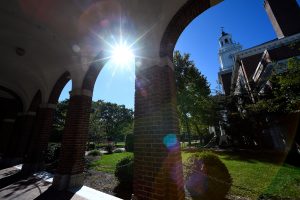
“From granular continuum modeling to simplified locomotion models”
Presented by Professor Kenneth Kamrin
Department of Mechanical Engineering, Massachusetts Institute of Technology
This talk focuses on continuum models for granular flow and efforts to use these models to obtain simple locomotion relations for self-propulsion in granular terrains. First, we motivate the usage of a basic tension-free frictional-plastic constitutive model for granular intrusion. Then we present a meshfree simulation approach based on the Material Point Method to implement the model up to huge strains. This approach is then demonstrated to reproduce a variety of experimental data for locomotors moving in granular beds. The continuum model is then exploited in two ways to produce rapid methods for predicting locomotion of arbitrarily shaped intruders. First, we show that the model gives rise to the Resistive Force Theory (RFT) of slow granular intrusion, which had previously been observed as an experimental correlation for the forces on the surface of a granular intruder. We use the model to infer an advanced version of RFT that can be applied to rapid locomotion like running or driving in sands, and show that it correctly predicts the transition between rolling and slipping as arbitrarily shaped wheels spin faster. Second, we perform a Buckingham Pi analysis on the simple continuum model to identify a set of scaling relationships that can be used in intruder design much like scaling laws that are enjoyed in fluid mechanics. We demonstrate that the scaling relationships hold in a variety of experimental and numerical tests and can predict driving performance in different gravities based on earthbound data. Further, we show how the continuum model can be extended to account for cohesive grains and use it to deduce corresponding scaling relations for locomotion in cohesive soils.
Ken Kamrin received a BS in Engineering Physics and a minor in Mathematics at UC Berkeley in 2003, and a PhD in Applied Mathematics at MIT in 2008. Kamrin was an NSF Postdoctoral Research Fellow at Harvard University in the School of Engineering and Applied Sciences before joining the Mechanical Engineering faculty at MIT in 2011, where he was appointed the Class of 1956 Career Development Chair. Kamrin’s research focuses on constitutive modeling and computational mechanics for large deformation processes, with interests spanning elastic and plastic solid modeling, viscous and non-Newtonian flows, amorphous solid mechanics, and fluid-structure interaction. Kamrin has been awarded fellowships from the Hertz foundation, US Defense department, and National Science Foundation. Kamrin received the 2010 Nicholas Metropolis Award from APS, the NSF CAREER Award in 2012, the 2015 Eshelby Mechanics Award for Young Faculty, the Ruth and Joel Spira Teaching Award from the MIT School of Engineering in 2016, and the 2016 ASME Journal of Applied Mechanics Award. He is currently on the Board of Directors of the Society of Engineering Science.